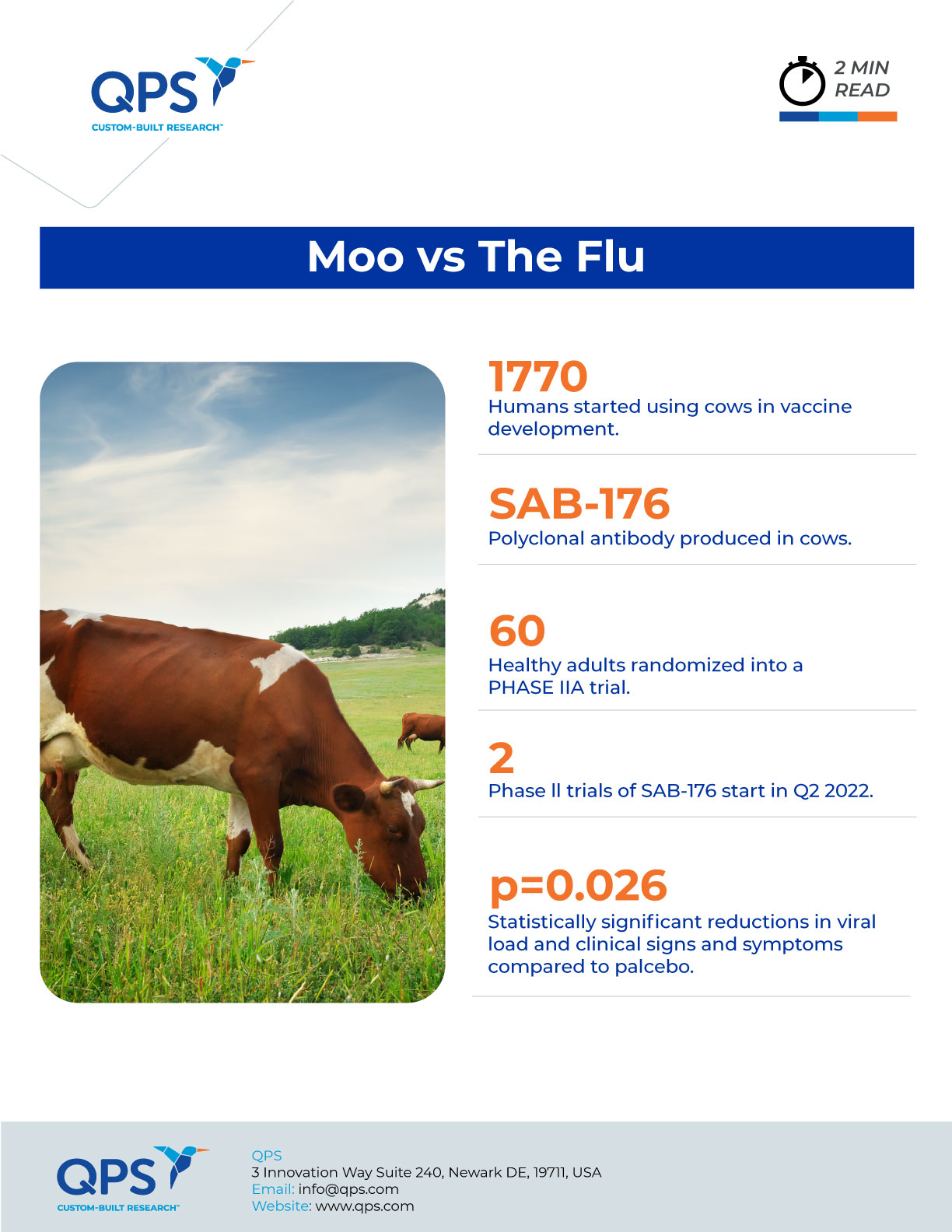Humans have used cows in vaccine development dating back to 1770 and the origins of the smallpox vaccine. In more modern medicine, transgenic cows have played a role in making antigen-specific human antibodies for Ebola virus, anthrax, Middle East Respiratory Syndrome coronavirus (MERS-CoV), and hantavirus — and we may soon see seasonal flu added to that list.
According to results from an early-stage challenge study announced in December, polyclonal human antibodies produced in transgenic cows have been shown to help combat seasonal flu. SAB Biotherapeutics noted that its therapy, SAB-176, will be moving into Phase 2 trials later this year (2nd quarter, 2022). Polyclonal antibodies, which recognize multiple epitopes, can be thought of as targeting a virus from multiple directions. Monoclonal antibodies, on the other hand, represent one path of attack and may not be as effective against a mutating virus.
The randomized, double-blind, placebo-controlled challenge study of SAB-176 (Identifier NCT04850898) was conducted in 60 healthy adult participants inoculated with a pandemic influenza virus strain (pH1N1). Study participants were randomly assigned to receive either SAB-176 (25 mg/kg dose) or placebo and were intranasally inoculated with pandemic H1N1 (2009/California) virus. Nasopharyngeal swabs were taken eight days after inoculation.
Potential Treatment for a Mutating Virus
Although the company did not release supporting data from the study, it did report that SAB-176 achieved statistically significant (p = 0.026) reductions in viral load and clinical signs and symptoms compared to placebo and appeared to be safe and well-tolerated. Most adverse events were mild to moderate and there were no serious adverse events reported that were related to the treatment. Further, the results showed that SAB-176 is effective against both known and unknown viral variants, making it a useful tool against rapidly mutating pathogens.
“These data suggest that SAB-176 has the potential to be an effective treatment for this prevalent, highly mutating virus that resurfaces annually and is a major source of hospitalizations and deaths,” said Tom Luke, MD, Chief Medical Officer of SAB Biotherapeutics.
Human Antibodies Produced by Cows
By using transgenic cows, SAB can produce large quantities of specifically targeted, high-potency, human polyclonal antibodies without human donors. The DiversitAb™ immunotherapy platform uses transchromosomic cattle (Tc Bovine™) that have been modified to have a human artificial chromosome and generate fully human antibodies (immunoglobulin G) rather than bovine antibodies, in response to inoculation with an immunogen.
“One remarkable aspect of these results is that SAB’s Tc Bovine were not immunized to the specific influenza virus strain that was used in the challenge study,” said Christoph Bausch, PhD, Chief Scientific Officer of SAB Biotherapeutics. “Nonetheless, the statistically significant reduction in virus load and symptoms that were achieved confirm that SAB-176 demonstrated high cross-reactivity to this pandemic strain. This reinforces a unique and timely feature of our DiversitAb platform—the diversity of the human antibodies it produces gives our therapeutics the potential to be broadly neutralizing to both known and unknown viral variants—a very valuable feature when addressing rapidly mutating pathogens.”
To develop and produce SAB-176, Tc Bovine were hyperimmunized with a quadrivalent antigen, including multiple influenza strains. After the Tc Bovine generated significant amounts of fully human antibodies against the virus, plasma was collected (in a similar manner as from human plasma donors) and purified to isolate the antibodies that make up the treatment.
The DiversitAb platform was also used to produce SAB-176, the company’s candidate polyclonal antibody therapy for people with mild to moderate COVID-19, which is currently being evaluated in a Phase 3 study.
Competing Anti-flu Antibodies
Other groups are developing antibody therapy candidates against the seasonal flu. For example, research partners Vir Biotechnology and GSK have two anti-influenza monoclonal antibody products, engineered from antibodies collected from human donors, in Phase 2 trials. They have reported that one of these, VIR-2482, has broad coverage against the major strains of influenza A and may serve as an alternative to current flu vaccines.
Whether with polyclonal or monoclonal antibodies, developed in cows or collected from humans, researchers continue to harness the immune system’s natural abilities to prevent and treat viral infection.
Did you enjoy this blog post? Check out our other blog posts as well as related topics on our Webinar page.
QPS is a GLP- and GCP-compliant contract research organization (CRO) delivering the highest grade of discovery, preclinical and clinical drug research development services. Since 1995, it has grown from a tiny bioanalysis shop to a full-service CRO with 1,100+ employees in the U.S., Europe and Asia. Today, QPS offers expanded pharmaceutical contract R&D services with special expertise in neuropharmacology, DMPK, toxicology, bioanalysis, translational medicine and clinical development. An award-winning leader focused on bioanalytics and clinical trials, QPS is known for proven quality standards, technical expertise, a flexible approach to research, client satisfaction and turnkey laboratories and facilities. Through continual enhancements in capacities and resources, QPS stands tall in its commitment to delivering superior quality, skilled performance and trusted service to its valued customers. For more information, visit www.qps.com or email info@qps.com.








